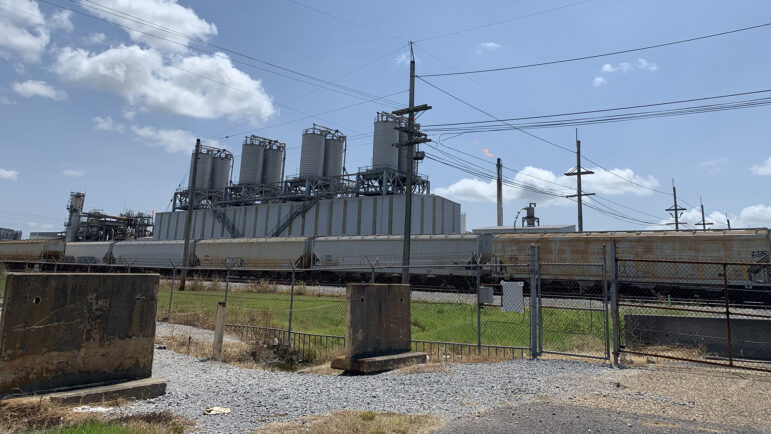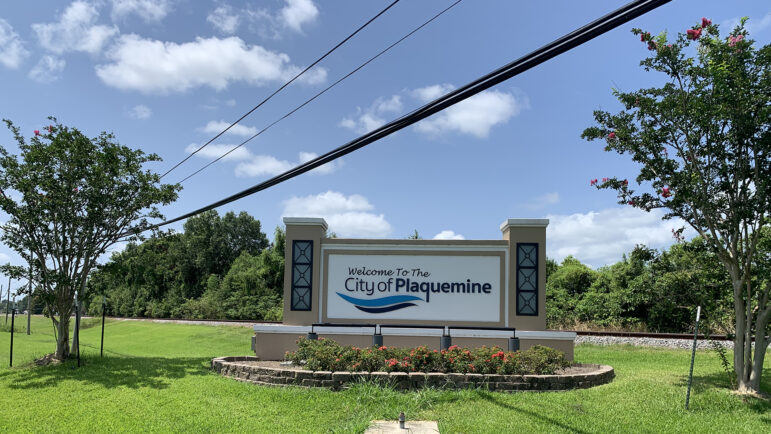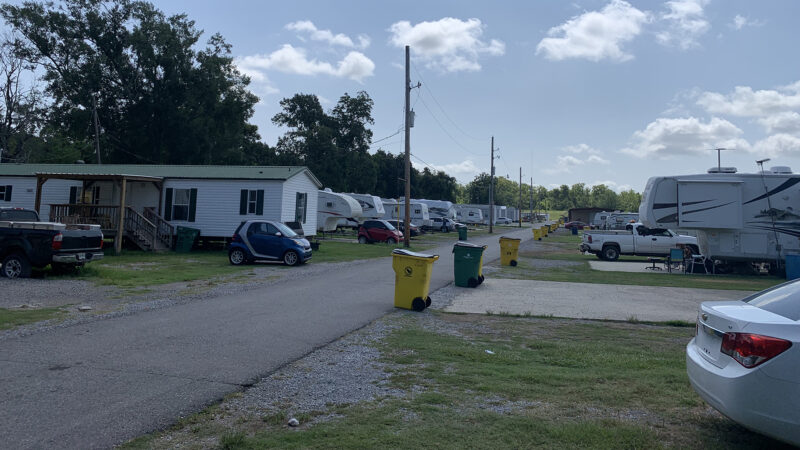Residents near Louisiana Dow plant are skeptical after explosion: ‘You can’t trust them’
The Tullier Trailer Park in Plaquemine, Louisiana, sits about a block away from the Dow Chemical plant, on July 19, 2023. An explosion at the Dow plant happened just after 9 p.m. on Friday, July 14, 2023, with many residents saying they heard and felt the blast from their homes.
Just before noon at the Tullier Trailer Park in Plaquemine, Louisiana, the sun is blazing in a cloudless sky and the temperature is already creeping toward 100 degrees. Despite this, Toni Smith and her husband are outside, mowing the small patch of grass in front of their mobile home.
“We’re just trying to get it done before it gets too hot out here,” Smith said, wielding a weed eater. “Because it’s hot, not warm — hot.”
The small mobile home community lies about a block away from the massive Dow Chemical plant. Just a few days before, there was a massive explosion at the facility. It rattled nearby homes and sent a huge mushroom cloud into the night sky.
“I was sitting in the house watching TV, and the next thing I know, my whole trailer shakes,” Smith said. “First thing I said was, ‘Something happened at Dow.’”
@rachin_cajun_lrc Replying to @CajunMike_94 #dow #chemical #chemicalplant #explosion #chemicalexplosion #plaqueminela #dowplaquemine #louisiananews #mushroomcloud #glycol #louisianatok ♬ original sound – Rachin’Cajun~LRC
Dow did not respond to interview requests for this story and has not released specific details about the July 14 event yet, but the company says it’s conducting an internal investigation. Dow officials have stated that air monitoring data shows the air surrounding the plant is safe and say they are continuing to monitor conditions at the site and in the community. Anne Rolfes, executive director of Louisiana Bucket Brigade said the Dow’s attempts to “downplay” the event are “absurd.”
The incident drew national attention and reignited environmental concerns for communities raised after the derailment of a train carrying hazardous materials in Ohio earlier this year. But the people who live nearby the Dow Chemical Plant, like Smith, weren’t shocked. It’s happened before and, even though the company has given the all-clear about air quality, some neighbors remain skeptical.
The blast comes just over eight months after a spill at the same unit inside the Dow plant called Glycol II. This unit makes industrial chemicals like ethylene oxide, which is used to create products like detergents, disinfectants, and antifreeze. During last year’s spill, an estimated 10,300 pounds of ethylene, 11,775 pounds of methane and 763 pounds of ethylene oxide were released — it was the largest spill in the plant’s history. And in November 2019, a tank in the Glycol II unit ruptured, which sent a shock wave that shook homes for miles around the facility.

“There was a mushroom cloud over Baton Rouge, or near Baton Rouge,” Rolfes said. “In these kinds of accidents, it’s always hard to get the information. That is part of the cloak of secrecy and the lack of transparency that big corporations like Dow benefit from.”
For advocates like Rolfes, this lack of transparency is nothing new. The region is littered with oil and gas and chemical plants. Rolfes said these types of accidents — and the spokespeople coming out afterward and saying nothing happened — have been happening for decades along the Mississippi River.
In April 2022, there was a large leak of toxic chlorine at the Olin Chemical plant, one of the Dow Chemical facility’s neighbors. That spill sent at least 39 people to the hospital with symptoms related to chlorine exposure, and the Louisiana Department of Environmental Quality (DEQ) later said the extent of the spill was underreported by Olin and Dow.
For Janecia Green, who also lives near the Dow plant, the reason for her skepticism is simple.
“It’s a chemical plant. You can’t trust them,” she said. “And I stay right here.”
Green and her two-year-old son were woken up by the sound of the recent blast. She and her neighbors received alerts to go back inside and shelter in place, which she did. The alert also said to turn off their fans and air conditioning to help keep out any potentially harmful chemicals that may have been released.
Like the rest of Louisiana, Plaquemine is in the midst of an unprecedented heat wave, and even though the explosion happened around 9:30 p.m., Smith said that her trailer quickly turned into a hotbox after she turned off her A/C.
“It was very uncomfortable,” she said. “It was very hot. Real hot.”
The heat made it difficult for her two-year-old son to get back to sleep, so Green stayed up with him for more than eight hours — until the all-clear was given.
Even after getting the alert that it was safe to turn back on their A/C, Tullier Trailer Park residents said they didn’t necessarily trust that there weren’t any chemicals in the air.
Smith said she could smell something “sweet,” which made her think there was antifreeze present in the air. Ethylene oxide does give off a sickly sweet, ether-like scent, but Dow officials stated there weren’t any harmful levels detected after the explosion.

Rolfes said the air monitoring Dow conducted may have been solely focused on the danger present to workers inside the plant to determine whether or not an evacuation is required.
“And that’s really important to do. We want the workers to be safe,” Rolfes said. “But the problem is that they absolutely manipulate those readings and then extrapolate them to an assurance of general safety.”
The explosion happened less than 15 miles from the Louisiana Governor’s Mansion and across the river from the home of U.S. Rep. Garret Graves (R-La.). Neither Gov. John Bel Edwards nor Rep. Graves has issued a response.
Rolfes said Graves’ silence is especially troubling given his efforts to roll back oversight of dangerous chemical plants, refineries, plastic plants and gas export terminals — like the Dow Chemical facility — this past legislative session.
“And he’s the one who is making plans to do it again in the next Congress,” Rolfes said.
Rep. Graves did not respond to questions for this story.
Rolfes would like to see air monitors set up in the neighborhoods that surround the facility that could easily track any chemicals that are released. With little information to work with, nearby residents, like Toni Smith, go about their daily business as usual.
Smith said she’s worried about another explosion or spill, but there’s isn’t much she can do about it.
“Sometimes, I do think about it,” Smith said. “But, I mean, what are you going to do? You can’t run. You can’t get away from it.”
This story was produced by the Gulf States Newsroom, a collaboration between Mississippi Public Broadcasting, WBHM in Alabama, WWNO and WRKF in Louisiana and NPR.
Correction: This story has been updated to clarify ongoing community air monitoring.
In Berlin, there are movies, there’s politics and there’s talk about it all
Buzz around whether the city's film festival would take a stance on the war in Gaza has dominated conversation in recent days.
Alex Ferreira wins 10th gold medal for Team USA, matching America’s highest total in Winter Olympics
Freeskier Alex Ferreira clinches a tenth gold medal for the U.S. in these Games, tying the U.S.'s all-time record for gold medals in a Winter Olympics.
Trump calls SCOTUS tariffs decision ‘deeply disappointing’ and lays out path forward
President Trump claimed the justices opposing his position were acting because of partisanship, though three of those ruling against his tariffs were appointed by Republican presidents.
The U.S. men’s hockey team to face Slovakia for a spot in an Olympic gold medal match
After an overtime nailbiter in the quarterfinals, the Americans return to the ice Friday in Milan to face the upstart Slovakia for a chance to play Canada in Sunday's Olympic gold medal game.
NASA eyes March 6 to launch 4 astronauts to the moon on Artemis II mission
The four astronauts heading to the moon for the lunar fly-by are the first humans to venture there since 1972. The ten-day mission will travel more than 600,000 miles.
Skis? Check. Poles? Check. Knitting needles? Naturally
A number of Olympic athletes have turned to knitting during the heat of the Games, including Ben Ogden, who this week became the most decorated American male Olympic cross-country skier.








